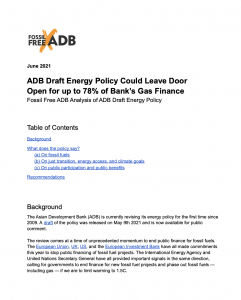The Asian Development Bank (ADB) is currently revising its energy policy for the first time since 2009. A draft of the policy was released on May 9th 2021 and is now available for public comment.
The review comes at a time of unprecedented momentum to end public finance for fossil fuels. The European Union, UK, US, and the European Investment Bank have all made commitments this year to stop public financing of fossil fuel projects. The International Energy Agency and United Nations Secretary General have all provided important signals in the same direction, calling for governments to end finance for new fossil fuel projects and phase out fossil fuels — including gas — if we are to limit warming to 1.5C.
In a review of its existing 2009 energy policy, the ADB noted the policy “is no longer adequately aligned with the global consensus on climate change, recent changes in the energy sector of DMCs, the ongoing transformation of the energy sector globally, and ADB’s new Strategy 2030.”
The new draft energy policy has some key improvements, but still falls far short of what is needed for climate leadership as it leaves space for continued large-scale gas investments. The draft provides broad conditions for continued gas finance that include few details. If these conditions are applied liberally, they could allow for as much as 78% of the ADB’s gas finance since Paris to continue. This would be out of sync with climate science and the recent net-zero energy scenario published by the IEA.
Continued support for long-lived carbon-intensive gas infrastructure threatens to impede a just transition to renewable energy. The IPCC’s landmark 1.5°C report states that, “[s]ince the electricity sector is completely decarbonized by mid-century in 1.5°C pathways, electrification is the primary means to decarbonize energy end-use sectors.” This means that both coal and gas must be phased out of the power sector. Building gas power plants instead of coal plants today, will not cut emissions by nearly enough. With the falling costs of renewables, investment in gas infrastructure risks burdening governments with stranded assets, higher energy costs and dependence on imports.
Since the Paris Agreement, the ADB has financed at least $4.9 billion in fossil fuels, almost all of which (96%) has gone to gas. The ADB cannot be a climate leader without a clear end to gas finance.
Further, since the release of the ADB draft energy policy last month, the ADB has failed to meaningfully consult with civil society groups from across Asia and beyond. The ADB has not disclosed information about the timeline for consultations nor the process for considering input.
This analysis outlines key elements of the policy, concerns and specific recommendations for the ADB as it revises the draft energy policy.

